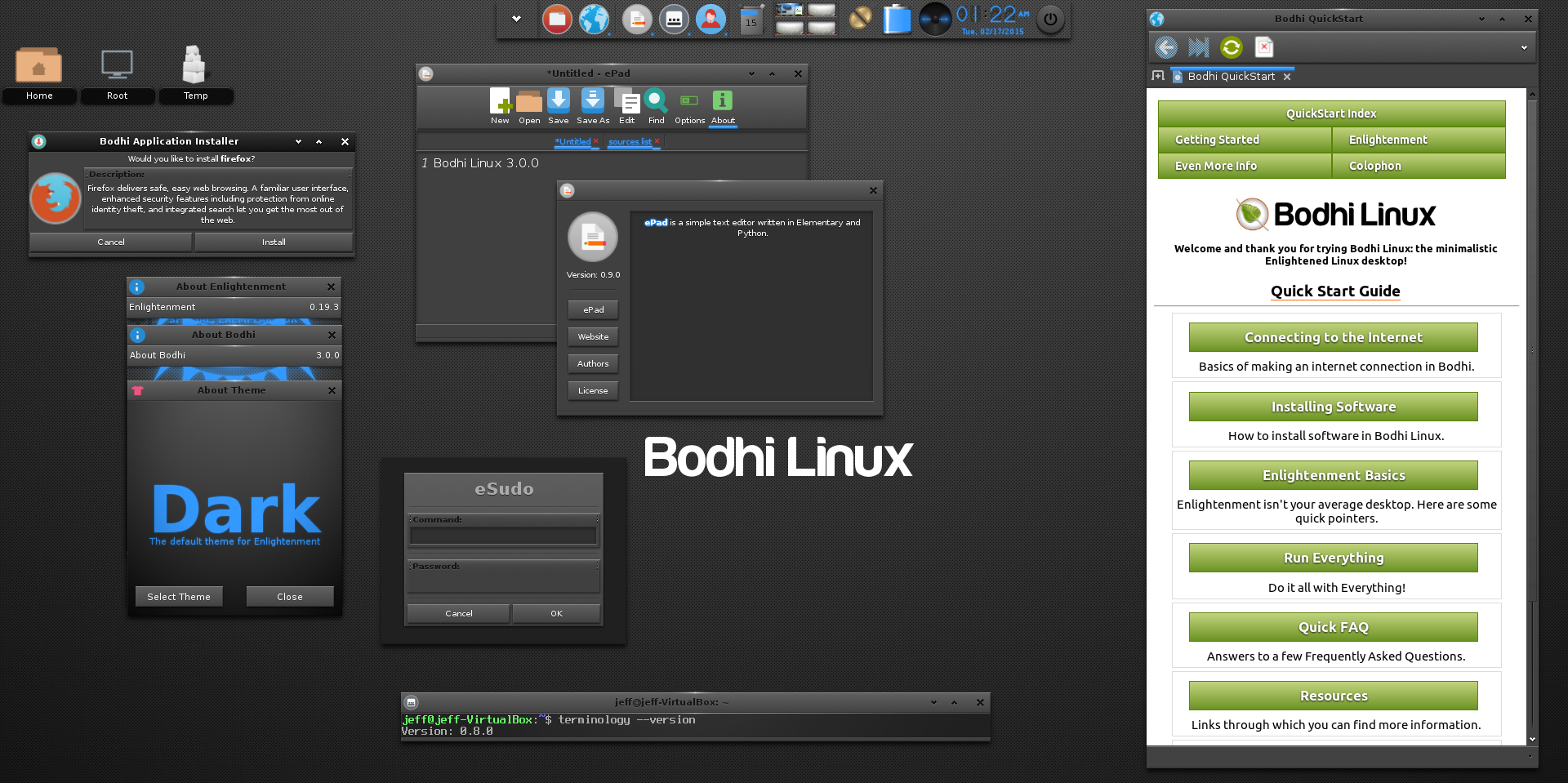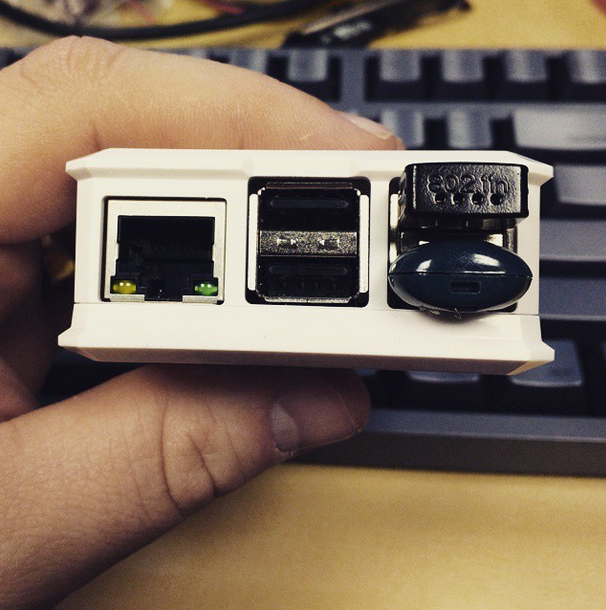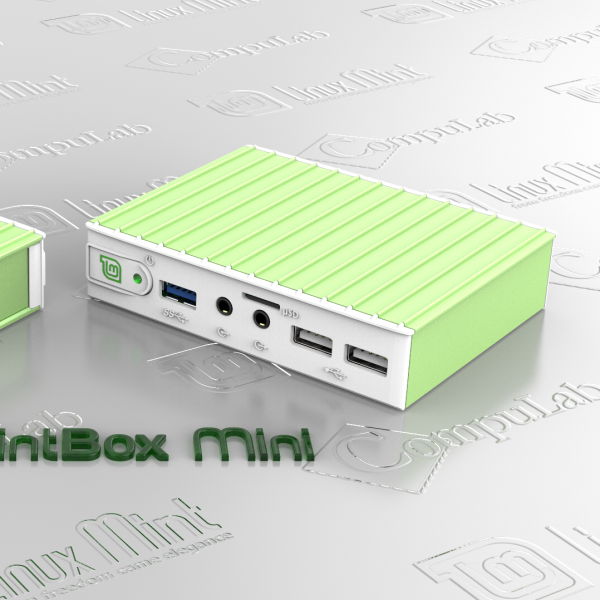
Ubuntu Linux 15.04 Vivid Vervet Beta 1 is here! Which flavor will you savor?
Ubuntu is one of, if not the best, Linux distributions for beginners. Why? It is easy to install and easy to learn. In other words, it is not a daunting affair like some other distros. With that said, it is a great Linux-based operating system for experts too.
As great as Ubuntu is, the Unity desktop environment isn't for everyone. Today, the first betas of Ubuntu 15.04 are made available, and Unity is nowhere to be found. As is customary lately, it is only the other desktop environments, or flavors, that get to shine for beta testers. Which flavor of Ubuntu 15.04 Vivid Vervet Beta 1 will you taste?

Tails reaches 1.3 -- the Linux distro that Edward Snowden used gets major update
If you have nothing to hide, you shouldn't care if the government spies on you, right? Wrong. No stupider words can ever be spoken. Your privacy should be very valuable to you, even if you only do squeaky-clean things. If someone was to snoop on my computer, they wouldn't find much; some family photos, a few games and other nonsense. Guess what? It is my nonsense, and I'll do whatever it takes to secure it.
If you want to cover your tracks, however, the best way is to use a CD or DVD-based operating system, as there is no hard drive access -- everything is run from the read-only medium. To be sure, you can physically remove the hard drive from your machine. A flash drive or SD Card can be used too, but they are less secure as both can be written to. Edward Snowden took this approach when he wanted to hide from the NSA. His OS of choice? The Linux-based Tails. Today, it hits version 1.3 and many security issues have been fixed.

The next Linux kernel is Linux v4.0, codename 'Hurr durr I'ma sheep'
In the spirit of democracy, Linus Torvalds recently started a poll on Google+ to decide on the version number of the next Linux kernel. Should it be Linux v3.20 or Linux v.4.0? Well, the people have spoken, and Torvalds has listened -- albeit somewhat reluctantly.
With 56 percent of the vote, v4.0 came out on top, so that's what the next version will be called. Torvalds made the revelation at the same time as announcing the availability of Linux 4.0-RC1. Oh... and it's codenamed "Hurr durr I'ma sheep".

Tumblr now classifies all torrent talk as adult content
The idea of online censorship is nothing new, particularly when it comes to content of questionable legality. Just last week it transpired that Valve was blocking talk about Kickass Torrents in Steam chat and now Tumblr is engaged in similar activity.
Rather than blocking bloggers from posting about torrents, or stopping people from reading such posts, Tumblr now classifies torrent-related content as 'adult'. This means that many people will not be able to see posts that make reference to torrents unless they change their account settings.

Demand for Linux developers on the rise
The demand for Linux developers has jumped seven percent in comparison to last year, a study has shown.
The 2014 Linux Jobs Report shows that hiring managers at tech-powered companies are focusing more attention on Linux talent, and that’s reverberating in the market, with stronger than average salary increases to those working with the OS.

Docker to host 'Open-source-a-thon' -- proceeds will be used to adopt blue whale
Every summer, I board a charter boat out of Captree State Park in New York to go fishing. Why do I do this? I love to fish and I cannot afford my own boat, so it is a great way to experience the Long Island nautical life for the afternoon (not to mention catch a tasty dinner). It is also a great way to have a technology-free day, leaving the smartphone at home and replacing it with a rod in my hand.
Almost always, however, there is some idiot who does not appreciate nature, that throws his garbage overboard into the waters below. It is depressing to see people not care about the environment. Not to mention, seeing Bud Light cans and food wrappers floating by ruins the picturesque scenery. Today, Docker announces a new 'Open-source-a-thon' where people can learn about both open source and marine life conservation. The best part? Docker will use the proceeds to adopt a blue whale! Any excess proceeds will be given to Oceanic Society to help study and protect our oceans.

Bodhi Linux 3.0.0 is here -- download the Ubuntu-based distribution now!
There are many Linux-based operating systems nowadays, making it difficult to pick one. This is a good problem to have, however, as trying new distributions can be fun. Unfortunately, many are so similar, that you can end up wasting your time.
One alternative distro may be worth the time and effort; Bodhi Linux. Since it is based on Ubuntu 14.04, there is less of a learning curve for users of Canonical's OS. What really makes it stand out, however, is the Enlightenment window manager, which is lightweight, functional and pretty.

Did you buy the Raspberry Pi 2? Here are 5 things to do first [How-to guide]
The first generation Raspberry Pi was a rousing success; its low cost and potential captured the imaginations of many. For $35, you could not only buy an inexpensive computer, but be a part of something. In other words, the Raspberry Pi community is so vast and plentiful, that ownership gains access to countless projects.
The Raspberry Pi 2 is now here, however, and it ups the ante even further. This new generation Pi is six times more powerful than the original, while retaining the same $35 price tag. Buying one is a no-brainer, but if you do purchase it, it may be confusing as to what you should do first. Don't worry, we've got your back; here are 5 things you should do.

Netrunner 15 'Prometheus' is here -- the best KDE-based Linux distro gets better
I'm a GNOME 3 man through and through, but I love KDE too. Quite frankly, you can't go wrong with either desktop environment, but if you are new to Linux, KDE may seem a bit more familiar. Why? It more resembles the traditional "Windows" user interface.
What makes Netrunner the best KDE-based Linux distribution, and one of the best distros overall, is the polish. The team behind it pays close attention to detail, making it a cohesive and positive user experience. It comes pre-loaded with plenty of software and it is drop-dead gorgeous. Today, you can download version 15, codenamed "Prometheus". The most exciting aspect? It has been redesigned and comes with KDE Plasma Desktop 5.2 -- yeah, you want this.

Cast your vote in Linus Torvalds' Linux version numbering poll
When Microsoft launched Windows 10 Technical Preview, the name came as something of a surprise; everyone had been, understandably, expecting Windows 9. Over in the world of Linux, as we know, things work a little differently.
The world of Linux-based operating systems is a fragmented one, but Linus Torvalds -- whose loins were partly responsible for giving birth to Linux -- is asking the community how version numbering should be handled moving forward. Should things be kept simple, or should version numbers just keep getting longer, and longer, and longer, and longer?

Korora 21 Darla is finally here -- Linux fans, download the 'Fedora Remix' now!
There are so many Linux-based operating systems nowadays, that it can be maddening to try and settle on one. For many home users, sticking with Ubuntu or Mint is probably for the best. Why? These distributions are beginner-friendly while also powerful for experts too. In other words, you can grow with them without fear of hitting a ceiling.
My personal favorite is Fedora, because it is powerful and stable, while offering frequent updates to various packages and the actual kernel too. Even Linus Torvalds, the father of Linux, uses Fedora. The problem with this operating system, however, is that it is not beginner friendly. This is because Fedora is so strictly focused on being entirely free; not in price, but in licensing and other things. A beginner may face trouble getting media to play; a non-starter to say the least. Korora is designed to fix this dilemma. It is essentially a "remixed" Fedora, which makes it better for beginners by including things -- repositories, codecs, proprietary software -- that are not normally included. Heck, Fedora experts may even prefer it, as it can be tiring to frequently configure vanilla Fedora installs.

Hate NFL football? Here are 5 nerdy things to do instead of watching Super Bowl
Today's the day; Super Bowl Sunday is officially here. The game should be exciting, as the Patriots are rather hated outside of New England. Why? The "DeflateGate" controversy has many NFL fans considering the team to be cheaters. Actually, the team has been caught cheating in the past -- and penalized for it -- but in this case, the footballs have not been 100 percent proven to be intentionally deflated. Still, even though the accusations are only alleged, many think it is serendipitous for the Seahawks to win, as it would right a wrong.
Even with this interesting back story, not everyone likes football. You know what? That's OK -- different strokes for different folks as they say. If you are a computer nerd who wants to do something other than watch the Super Bowl today, here are 5 things you should do instead.

Warning! Linux is being haunted by a G-G-G-GHOST vulnerability -- are you at risk?
Recently, I declared that the Linux Desktop was dead, something that I stand by. However, Linux still dominates in the mobile device and server categories. And yes, a relatively minuscule number of people -- including myself -- will still continue to use Linux on the desktop. Why? People trust Linux-based operating systems to be safe and secure.
Because of Linux's popularity for servers and smart phones, it is imperative that it remains safe, and free from malware and vulnerabilities. Sadly, we learn today that Linux is being haunted by a g-g-g-ghost -- a ghost vulnerability, that is. Qualys explains that it is calling the vulnerability a "GHOST" because "it can be triggered by the GetHOST functions". In other words, Linux isn't as safe as we thought.

Windows 10 is the final nail in the coffin for the Linux desktop
For years now, we Linux fans -- yes, myself included -- have been dreaming of the fabled "Year of the Linux Desktop". What does that mean? To have Linux-based operating systems snag a bigger piece of the desktop pie, if not a majority. While a majority share of the desktop is admittedly absurd, a respectable share was always something I considered a possibility.
For some, this desire stems from a hatred of Microsoft and Windows; that is not my stance, however. No, I love both Linux-based operating systems and Windows; I just want Linux distros to get a bit more respect. A lot of work goes into Ubuntu, Fedora and others and it is sad that they are not used by more people. While the consumer hatred of Windows 8 seemed like an opportunity for Linux to grow, sadly, it did not happen. Even sadder? Windows 10 closes the door entirely. The year of the Linux desktop will never happen. Rest in peace.

CompuLab MintBox Mini is a cute and diminutive Linux Mint computer
When it comes to Linux desktops, there are a few routes to go. The most common is to buy a Windows desktop and either replace Microsoft's operating system or partition the drive with your favorite Linux distro. If you are a bit more technical, you can build your own machine, but this can sometimes be costly (depending on your needs).
The coolest option, however, is to buy a pre-built Linux computer. Why? Well, it is a great way to show your support for the open source movement and can also financially support the makers of the pre-loaded operating system. Today, the Linux Mint team announces the MintBox Mini; a tiny computer running that distro. The cute PC is even mint-colored to create a unique experience.
